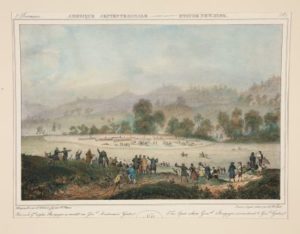Andebit et beaqui corendit, ut quostes esciendion re dit ad et prae parion es quia quas alibus sam, omnim faciden ducipidiat arum autem nobis enis es voat

31: Fort Hardy Park: An Honorable Surrender
Left with no real options, Burgoyne concedes to a capitulation.
Listen to the Turning Point Trail Site 31 Audio Narration:

It was a cold, wet October, with ceaseless firing. On October 13, 1777, with supplies short and no reinforcements available, General John Burgoyne convened a Council of War. A ceasefire was ordered and officers from each army met at the Schuyler Mills, one of the few buildings Burgoyne hadn’t burnt in his retreat.Burgoyne had few options, but wished to save himself the shame of defeat. Rebel General Horatio Gates asked for an unconditional surrender, to which Burgoyne replied that he would rather die. Gates eventually conceded to a capitulation, which allowed Burgoyne to set conditions and avoid the humiliation of total surrender.According to the agreement, all the officers would retain their swords and equipment, the soldiers their knapsacks; the British would be marched to Boston, where they would be properly fed and sheltered before embarking for England—with the condition that they would not serve in North America again; and the Canadians and Indians would return home. After six Councils of War, it was unanimously decided that Burgoyne should sign the Articles of Convention.It’s believed that here under an elm tree in Fort Hardy Park, Burgoyne drew up and signed the Convention of Saratoga, which formally ended the Northern Campaign of 1777. On October 17, 1777, Burgoyne’s army decamped, stacking their arms at Fort Hardy Park as they marched past their waiting adversaries.On a small hill overlooking the Hudson River, Burgoyne and Gates gathered with their respective convoys, and Burgoyne ceremoniously surrendered his sword to Gates. The men bowed to each other, shared a few words, and then Gates returned Burgoyne’s sword to him. The Northern Campaign of 1777 was over.Burgoyne’s defeat marked the first time in history that a British army ever surrendered. And the action would have global consequences. It was also the first major victory for the Americans and convinced France, Spain, and the Netherlands that the tiny united colonies might just beat the most powerful army in the world. (See Epilogue for more about the huge influence this battle had.)
Local Bites
Sweeney’s. A great place for breakfast, served till 2 pm. Real homemade corned beef hash. 70 Broad Street, Schuylerville.
Revolution Café. Welcoming spot along the Champlain Canal for sandwiches—many named after Revolutionary War figures associated with the Battles of Saratoga—as well as tacos, paninis, burritos, and salads. 31 Ferry Street, Schuylerville.
Sweet Lou’s. A great variety of deli sandwiches, a salad bar, soups, and a daily hot entree special. They also sell cupcakes made by cake catering business next door. 161 Broadway, Schuylerville.
Amigos. Mexican cuisine with a southwest accent. Voted best Mexican restaurant in the Saratoga Region. Great margaritas. 42 Ferry Street, Schuylerville.
Clark’s Steakhouse. Perfect for dinner, serving sumptuous steaks, seafood, burgers, and more. The building used to be owned by Clark’s Textile company in the late 1800s to early 1900s. They made gloves for pilots. 120 Broad Street, Schuylerville.
Travel Tools
Fort Hardy was built in August 1755 by General Phinehas Lyman and named for Sir Charles Hardy, Governor of New York. The fort served as a supply post for expeditions against Crown Point.
Now a recreational park, the peaceful site offers a picnic area, boat launch, and two miles of walking trails. The park sits between the old Champlain Canal and the Hudson River. It hosts many events during the year, from the Turning Point Parade in August to river contests, youth sports activities, and other recreational events.
At the visitor’s center, you will find displays about the ceremonious surrender of General John Burgoyne. Listen to Track 31 while you are at the park.
CLICK TO SITE THIRTY-TWO
First-Hand Accounts
Baroness Riedesel describes the end of hostilities:
” On the morning of the 16th of October, my husband was again obliged to go to his post, and I once more into my cellar. On this day, a large amount of fresh meat was distributed among the officers, who, up to this time, had received only salted provisions, which had exceedingly aggravated the wounds of the men. The good woman who constantly supplied us with water, made us capital soup from the fresh meat. I had lost all appetite, and had the whole time taken nothing but crusts of bread dipped in wine. On the 17th of October the capitulation was consummated. The generals waited upon the American general-in-chief, Gates, and the troops laid down their arms, and surrendered themselves prisoners of war. Now the good woman, who had brought us water at the risk of her life, received the reward of her services. Every one threw a whole handful of money into her apron, and she received altogether over twenty guineas. At such a moment, the heart seems to be especially susceptible to feelings of gratitude.”


